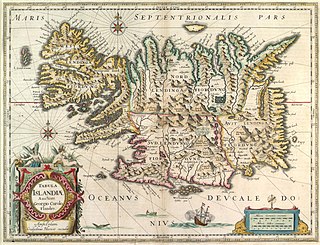
Iceland is a Nordic island country between the North Atlantic and Arctic Oceans, on the Mid-Atlantic Ridge between North America and Europe. It is culturally and politically linked with Europe and is the region's westernmost and most sparsely populated country. Its capital and largest city is Reykjavík, which is home to about 36% of the country's roughly 380,000 residents. The official language of the country is Icelandic. Iceland is on a rift between tectonic plates, and its geologic activity includes geysers and frequent volcanic eruptions. The interior consists of a volcanic plateau with sand and lava fields, mountains and glaciers, and many glacial rivers flow to the sea through the lowlands. Iceland is warmed by the Gulf Stream and has a temperate climate, despite a latitude just south of the Arctic Circle. Its latitude and marine influence keep summers chilly, and most of its islands have a polar climate.

Reykjavík is the capital and largest city of Iceland. It is located in southwestern Iceland, on the southern shore of Faxaflói bay. With a latitude of 64°08′ N, the city is the world's northernmost capital of a sovereign state. Reykjavík has a population of around 140,000 as of 2023. The Capital Region has a population of around 248,000.

The recorded history of Iceland began with the settlement by Viking explorers and the people they enslaved from Western Europe, particularly in modern-day Norway and the British Isles, in the late ninth century. Iceland was still uninhabited long after the rest of Western Europe had been settled. Recorded settlement has conventionally been dated back to 874, although archaeological evidence indicates Gaelic monks from Ireland, known as papar according to sagas, may have settled Iceland earlier.

Davíð Oddsson is an Icelandic politician, and the longest-serving prime minister of Iceland, in office from 1991 to 2004. From 2004 to 2005 he served as foreign minister and as the chairman for the Independence Party from 1991 to 2005. Previously, he was Mayor of Reykjavík from 1982 to 1991, and he chaired the board of governors of the Central Bank of Iceland from 2005 to 2009. The collapse of Iceland's banking system led to vocal demands for his resignation, both from members of the Icelandic public and from the new Icelandic Prime Minister Jóhanna Sigurðardóttir, which resulted in his being replaced as head of the Central Bank in March 2009. In September 2009 he was hired as the editor of Morgunblaðið, one of Iceland's largest newspapers, a decision that caused nationwide controversy and was followed by resignations and widespread terminated subscriptions. He contested the election for President of Iceland on 25 June 2016 but lost to Guðni Jóhannesson, coming in fourth place with 13.7% of the popular vote.

The Church of Iceland, officially the Evangelical Lutheran Church of Iceland, is the national church of Iceland. The church is Christian and professes the Lutheran faith. It is a member of the Lutheran World Federation, the Porvoo Communion, the Communion of Protestant Churches in Europe, and the World Council of Churches.

The University of Iceland is a public research university in Reykjavík, Iceland, and the country's oldest and largest institution of higher education. Founded in 1911, it has grown steadily from a small civil servants' school to a modern comprehensive university, providing instruction for about 14,000 students in twenty-five faculties. Teaching and research is conducted in social sciences, humanities, law, medicine, natural sciences, engineering and teacher education. It has a campus concentrated around Suðurgata street in central Reykjavík, with additional facilities located in nearby areas as well as in the countryside.

The Independence Party is a conservative political party in Iceland. It is currently the largest party in the Alþingi, with 17 seats. The chairman of the party is Bjarni Benediktsson and the vice chairman of the party is Þórdís Kolbrún R. Gylfadóttir.

The Progressive Party is an agrarian political party in Iceland.
Biography of Halldór Laxness is an Icelandic biography of novelist and Nobel Laureate Halldór Laxness by Hannes Hólmsteinn Gissurarson. It was published in three volumes:
- Halldór (2003)
- Kiljan (2004)
- Laxness (2005)
This article gives information on liberalism worldwide. It is an overview of parties that adhere to some form of liberalism and is therefore a list of liberal parties around the world.

The People's Unity Party – Socialist Party, generally referred to as the Socialist Party, was an Icelandic political party that functioned from 1938 to 1968, when the People's Alliance party was created.

Jón Þorláksson was prime minister of Iceland from 8 July 1926 to 28 August 1927. He was the only leader of the Conservative Party (Íhaldsflokkurinn) which merged with the Liberal Party to form the Independence Party in 1929, and the Mayor of Reykjavík from 1933 to his death.
Religion in Iceland has been predominantly Christianity since its adoption as the state religion by the Althing under the influence of Olaf Tryggvason, the king of Norway, in 999/1000 CE. Until then, in the 9th and 10th centuries, the prevailing religion among the early Icelanders — who were mostly Norwegian settlers fleeing Harald Fairhair's monarchical centralisation in 872–930, with some Swedes and Norse British settlers — was the northern Germanic religion, which persisted for centuries even after the official Christianisation of the state.
Individual fishing quotas (IFQs), also known as "individual transferable quotas" (ITQs), are one kind of catch share, a means by which many governments regulate fishing. The regulator sets a species-specific total allowable catch (TAC), typically by weight and for a given time period. A dedicated portion of the TAC, called quota shares, is then allocated to individuals. Quotas can typically be bought, sold and leased, a feature called transferability. As of 2008, 148 major fisheries around the world had adopted some variant of this approach, along with approximately 100 smaller fisheries in individual countries. Approximately 10% of the marine harvest was managed by ITQs as of 2008. The first countries to adopt individual fishing quotas were the Netherlands, Iceland and Canada in the late 1970s, and the most recent is the United States Scallop General Category IFQ Program in 2010. The first country to adopt individual transferable quotas as a national policy was New Zealand in 1986.

The Atom Station is a novel by Icelandic author Halldór Laxness, who was awarded the Nobel Prize in Literature in 1955. The initial print run sold out on the day it was published, for the first time in Icelandic history.

The Icelandic financial crisis was a major economic and political event in Iceland between 2008 and 2010. It involved the default of all three of the country's major privately owned commercial banks in late 2008, following problems in refinancing their short-term debt and a run on deposits in the Netherlands and the United Kingdom. Relative to the size of its economy, Iceland's systemic banking collapse was the largest of any country in economic history. The crisis led to a severe recession and the 2009 Icelandic financial crisis protests.

Icelandic is a North Germanic language from the Indo-European language family spoken by about 314,000 people, the vast majority of whom live in Iceland, where it is the national language. Since it is a West Scandinavian language, it is most closely related to Faroese, western Norwegian dialects, and the extinct language Norn. It is not mutually intelligible with the continental Scandinavian languages and is more distinct from the most widely spoken Germanic languages, English and German. The written forms of Icelandic and Faroese are very similar, but their spoken forms are not mutually intelligible.














